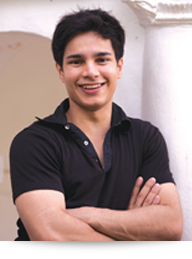 |
|
Radio-ing In On Life
by Dr Syed Aftab, Class of 2013
SingHealth, Singapore General Hospital, Department of Diagnostic Radiology
A lot of people have the perception that being a doctor is glamorous - a well-paying occupation with high social stature and noble, rewarding ideals of saving lives, especially at the most critical moments. It is also supposed to evoke a personal sense of pride and enable friends and family around us to bask in reflected glory. These are not totally false notions - being a doctor is certainly a fulfilling and honourable life-calling - but there is a lot of blood (pun unintended), sweat and tears shed that goes on behind the scenes that many are not aware of.
After graduating in 2013, I chose to join the radiology specialty. I am now in my second year of residency and just like any other grand journey in life, it has its ups and downs. I chose
|
|
radiology for many reasons. It offers a wide spectrum of specialties to subspecialise in 'including those that are more hands-on or otherwise, with varying amounts of patient contact. Radiology is challenging and exposes you to a wide range of medical pathologies and problems - all of which I figured would give me a sense of satisfaction in knowing that I will be required to have an extensive knowledge of various aspects of medicine.
Radiology also deals a lot with cutting-edge technology, which is exciting and necessary and challenges me to keep pace with the latest advancements in medicine. It also offers a small potential of having some work-life balance, which is always a welcome perk. We are always kept on our toes and have to be constantly updated with the changing medical landscape. Having a positive outlook certainly helps, no matter what happens.
As a resident now, one of my biggest realisations is that sense of responsibility. As a qualified doctor, you become the first line of defence against everything and anything that goes wrong. How your patient reacts is a reflection of your competency to a certain degree. Although this huge responsibility can be daunting, it is also an indicator of our growth. We have definitely grown in terms of having the confidence to make the best decisions for our patients and being competent doctors: a far cry from the uncertain, jittery medical students we once were.
I was recently awarded the 2014 Journal of Vascular and Interventional Radiology (JVIR) Editor's Award for Distinguished Clinical Study for my third-year research study as a medical student. My study focused on the efficacy and safety of cutting balloon angioplasty (CBA) versus high-pressure balloon angioplasty (HPBA) for treating haemodialysis fistula stenosis, which are resistant to conventional percutaneous transluminal angioplasty (PTA).
While I am definitely thrilled and ecstatic about winning this prestigious award, it is even more gratifying to know that my study will benefit patients. Now, physicians and interventionists have scientific proof that CBA may be superior in treating resistant stenosis and thus are more confident in making the decision of choosing CBA over HPBA. This should in turn reduce patient visits (given the superiority of CBA patency rate), physician/interventionist time, and costs for the patient and healthcare system.
Winning this award has certainly affirmed and inspired me to be a good radiologist and doctor overall. If anyone is considering balancing residency and research, my advice would be to select your projects carefully and exercise prudence in picking your mentors.
As I am writing this article, I am also preparing for my Fellow of the Royal College of Radiologists (FRCR) Part 1 exams. A lot of people may not know this but specialising in radiology requires me to sit for a lot of exams. I take each exam as a challenge and an opportunity to learn and grow, both professionally and personally. One way I keep myself motivated is to always keep my future goals in mind so that I do not lose sight of the bigger picture.
Therefore, being a doctor is not about the perceived glamour. It is about hard work, perseverance, dedication and a deep-seated desire to bring comfort and hope to humanity. But above all, it is certainly rewarding.
|
